Some people dream about experiencing the great American road trip, others just do it. Michael Boyink is one of those who did it and hasn’t looked back. He travels full time with his wife and 2 kids in a 30 foot RV. What started as a one-year experiment has evolved into an on-the-road family adventure story with an indefinite end. Michael took the time out to talk with me about dreaming big, life on the road with kids and taking life moment by moment. Enjoy.
[audio: http://www.unrulygrownups.com/wp-content/uploads/2012/12/UG-Interview-Michael-Boyink-2.mp3]
Hey everybody, this is Brandon. I’m meeting here today with Michael Boyink of www.Boyinks4Adventure.com. Michael travels full time in an RV with his family and I’m currently interviewing him from Mesa, Arizona. Based on our readership and based on the kind of interest that this blog gathers, I thought he’d be a perfect person to interview. Michael, welcome!
Michael: Thanks for having me.
Brandon: Our pleasure. Well I know this is one of my personal interests and I’m sure it will interest a lot of people out there. The idea of traveling full time in an RV with your family is just a dream for a lot of people. Some people think we’re completely nuts, and maybe we are, that’s okay. I’m just so excited about talking about this because not only is it kind of a personal dream but I’m just very intrigued of how you’ve made it work and kind of the back story of what led you up to make a decision. So why don’t we just start there. Tell us about you, tell us about your family, and tell us how you decided to make this trip happen.
Michael: I just turned 45 this past week, so that’s my age. I have two kids; a 15-year-old boy and a 14-year-old girl. I grew up taking long RV trips with my family so we took like a month or five weeks and went from Michigan and Colorado, Jeeping and kind of off road trail bike riding. So the whole RV role was very familiar, to me especially.
My wife grew up camping out of a popup trailer, so also a camper. Not quite the same little RV but still not quite a tent approach either.
I’ve been self-employed for ten years now. We’ve also always been home schoolers, so at some point we’re all sitting in the house and it occurs to us that we could be anywhere. There’s nothing really holding us in this physical spot except for friends, family, and a church connection so those two things just kind of came together at some point.
You referred to it as a dream; we literally called it our pipe dream. We’ve got a folder out on our network drive called Pipe dream and we would save bookmarks, stories, pictures, and that kind of thing. Just almost as a way of having conversation between my wife and I. We never really let the kids in on it because when kids are young you just always tell them those kind of plans.
And then my son turned 13 and we looked at each other and said, “Holy cow, we’ve got a teenager.” You start to feel that window start to close. If we want to do this as a family we’ve got to take it seriously. Even though we talked about it for years, we never really ran any numbers; we had never gone to look at what does an RV cost and can we actually do this.
We decided initially to just go see what it would cost, what do the different travel trailers and motor homes cost, could we afford one, would we have to buy one on a loan, how much would that be; how much would it cost us to do this thing.
We approached it initially with a cost. We didn’t find out any costs that were super prohibitive and our mindset quickly changed to, “Is there a reason to not do this? Is there anything that’s really going to prevent us from doing this?” Would we have to sell our house, do we get insurance, just all those kinds of administration kind of questions.
Now we didn’t really encounter any hurdle that we couldn’t easily solve, so it pretty quickly went from, “Can we do this? Is it possible,” to “Is there any reason not to,” to “Let’s just do this.”
Brandon: Wow. How long did it take you from that initial point to the point where you cast off? Tell me about that process a little bit.
Michael: I think we made the solid decision in November, probably of 2009. I always forget the years now. It took about nine months to do because we didn’t have anything; didn’t have a truck, didn’t have a trailer, we had to get different insurance, we had to figure out what to do with the house, just all that stuff took us about nine months.
Brandon: Okay. How did your children respond? You said they were teenagers at the time. Were they both teenagers?
Michael: Actually at the time they were 12 and 13, so one was a teen and one was kind of a pre-teen; very different personalities. The older is a boy, the younger is a girl.
My boy, being the older one, he’s very outgoing, more of a type-A personality. He was all for it and excited to do it. My daughter is more of an introvert. She’s my creative writer and just less vocal. She was a 12-year-old girl. She was initially pretty reluctant. She was kind of our hard sell. She didn’t really mentally join us on the trip until we had been gone physically about six weeks, I’d say.
Brandon: As far as convincing and talking to the kids about it, was it like, “Hey, we’re going to try this for a while and see how it goes?” Was it, “We’re going to do this for a year?” What was the sell for the kid that was a little more reluctant?
Michael: Actually it was, “We’re going to do this for a year.” That even came up when we were looking at RVs, like what do we buy? There are a million RVs out there in every different size, shape, and price point. We had to put parameters around it like let’s just set aside a year. We might like to do it permanently, we don’t know, we’ve got to try it. So let’s just say we’re going to do it for a year and that lets us make decisions because now we can say we only need a trailer that works for a year, or I only need a truck that works for a year. It even gets down to the data points of do I buy a diesel truck or a gas truck, and if you have parameters around it then you can start running the numbers and say this makes sense or this doesn’t make sense. So initially we just said we’re going to do it for a year and that really helped the decision-making process quite a bit.
Brandon: Tell us about how you managed the kids’ schooling. You said you’re home schoolers, terrific. How did you continue that and take that on the road? What was challenging about it and what was easy about it?
Michael: The home schooling has always been more of my life’s domain. The biggest thing getting ready for the trip was that she typically had– In the homeschooling world there’s kind of a continuum; at one end you’ve got total unschoolers who don’t do anything scheduled or organized, they just let life happen. At the other end of the continuum you’ve got people who have a dedicated room with a teacher’s desk and a schedule and run home school like a mini size school building.
We were always sort of floating in the middle of that. We were never hardcore one way or the other. My wife always had some curriculum; she would kind of mix and match from different sources depending on what the kids’ interests and abilities were.
In getting ready for the trip we had so much to do just to get ourselves physically on the road that all that school planning wasn’t getting done and she was getting really stressed out about it. I said, “Look, the last thing I want to do is be sitting outside Yosemite with Yosemite out the window of the RV but we can’t go there because we have workbooks to fill in.” That would be the wrong thing to do here.
So I said on that continuum let’s float more towards the unschooled for a year. They’re going to learn a ton just by our mode of travel. Yes, they may be behind somewhere here or there, but we’re talking 12 or 13-year-olds, they can make it up. If they’re a year behind their public school counterparts in a certain area, I really don’t care because they’re going to have an experience that most of those kids will never get. So that worked for our first year. Now since we’ve decided to go permanent, things have kind of changed and realigned since then.
Brandon: Okay. So how long have you been traveling now?
Michael: We did our year, we came home for six months because we had to sell the house and get rid of a whole bunch more stuff, and we had some business stuff to get in order again. We got back in the trailer in late April, so since April of this year until now. So about 18 months total out of the last two years.
Brandon: Okay. I would assume between unschooling and homeschooling, tell us a little bit about online resources. I know that we’ll get to it a little later, you’ve got a development company or you do software development to some degree and clearly you’re online and familiar with that space. Tell us whether it’s easier now than it has been, is it getting easier now to be able to do homeschooling via the web with the different resources out there?
Michael: Yeah, I think so. We haven’t done a lot of online stuff in the past, and we’re not 100% there now because the online stuff is great but you’ve got to have a solid internet connection and that’s not always the case. So each kid is now in at least one online class and we managed to find some that initially at least were even free.
There are just some amazing people doing ten-hour days teaching online classes at no cost. Again, it’s amazing; I don’t know how they expect that to last because they really don’t get paid for that. But it was a way for us to kind of experiment; is this going to work, how’s it going to work having a class on a schedule when the rest of our life is not on a schedule. But so far it’s been great.
My oldest especially was kind of hungering for more of the social side of things because he’s more of a social kid. So it was like let’s try this and see if that fulfills that need.
Brandon: Let’s talk a little bit about that; let’s talk about kids. That’s a question I’ve got. I’ve got an eleven and a seven-year-old. Tell us about the social element. I think that’s kind of a big question. I’m kind of in the same boat; I’ve got my older son who is definitely more social and needs interaction, and then I’ve got my seven-year-old who says, “Dad, I want to be home schooled,” and he’s happy being a hermit. So talk a little bit about that, how do you manage the social and the relationships with kids?
Michael: It is a challenge. In fact we’ve probably been asked more about that side of things than anything else in this whole particular lifestyle. Honestly you do end up alone or without other kids around a fair amount. A lot of it depends on the season. During the summer if you’re on campgrounds you have vacationing families around so there can be other kids during those times.
Like now we’re out in the west where public school kids are in school during the day. So in a campground, say in the middle of the week in November, chances are you’re not going to have other families around.
But we want to prioritize our relationship as a family and then the two kids as siblings. Mine are 19 months apart, so they’re close in age. My perspective as a dad is that I want to make sure those relationships are stronger. I’m more concerned about those relationships than friend relationships at this point just because I want the family unit to be strong. I’ve got a limited time with these guys in the house; I want to maximize our family time because I think we’ll benefit from that the rest of our lives.
And then there are things you can do. Like I said, in the summer there will be other kids around. We’re actually back in a park that we were already in during our first year. I kind of have a rule that I don’t want to repeat stuff, that’s kind of the point of being adventurous. But we came back because when we were here last time we met another family doing the same thing. So they were working here as camp hosts, they have four kids, they’re from out east, they sold their house and quit their jobs and hit the road in an RV as well. Our kids just really hit it off really well and the parents hit it off really well so we spent time with them here our first year around. We actually reconnected with them in upstate Washington because they moved down to work at another campground up there.
Then this year we heard that there was an opening here for another camp host. A camp host is someone who gets a free camping spot in exchange for working for the park. So we’re trying that here. We’re in the same campground with them again so the kids have those friends. We’re here for six weeks at this point. So the flexibility kind of allows you to find and make those relationships happen when it needs to.
Brandon: It sounds like it kind of works itself out a little bit.
Michael: Yeah, it does. My wife has been on some online forums for a while around different homeschooling curriculum. She’s thrown up posts like, “Hey, we’re in lower Mississippi. Is there anyone else around that wants to meet up?” We’ve been able to connect the kids for a day or two with other families that way.
Brandon: Fantastic. It sounds like the people that do this, the families that do this, are contrarian and they’re very family relationship conscious like yourself. So they’re like-minded, they connect and they have a lot of the same values.
Michael: Right.
Brandon: That probably plays a lot into this and how the dynamics work.
Michael: Yeah, we had a conversation with the other parents going, “We know your family time is really important. We don’t want to let our kids being here interrupt all of that, so can we work on a loose agreement of when the kids have free time to play with each other and when we need to be in our own places doing our schoolwork and being a family.”
Brandon: Fantastic. I would guess the families doing this are extremely receptive to that.
Michael: Oh yeah.
Brandon: Fantastic. This is just cool stuff. It’s just fun to talk about and think about this. Tell us about what were some of the biggest fears leading up to this. What are some of the myths and the lies about doing this? Some things that come to mind are, “Oh gosh, how are we going to make money? Are we going to kill each other because we’re in a ten-foot space? Can I take a shower in this closet?”
Michael: Right.
Brandon: Tell us about some of those fears and tell us the reality of it.
Michael: I think a lot of people think it’s really expensive because they see the price of gas and think, “Oh my gosh, we’re going to be paying that.” And you do have to budget for that. I think our first year on the road we spent about $9000 on fuel but that was moving, that was like 23,000 miles of driving and 34 states. The nice thing about fuel cost is you can control that. If it goes up too much then you stop driving and you find a park to be in for a while. Most RV parks have discounts for weekly or monthly rates, so if you find one you want to be in for a while you can buy a month at a time to get a discounted rate. So not only do you get your camping cheaper but you stop driving so much and your fuel costs go down.
And that’s the main sell, this work engagement that we’re doing here. We’re not paying for a campsite, we get propane for free, and there are other benefits to working here other than just a straight paycheck. So you can control your costs quite a bit.
You can also control your costs by the kind of RV that you buy. If you go out looking at a class-A motor home, the big bus style motor homes, you’re going to see $100,000 – $150,000. We couldn’t afford that, there was just no way. And I didn’t want to take out another loan for something like that. So if you look at travel trailers and fifth wheels that don’t have the drive train in them, you can get in quite a bit cheaper. I think we spent about $15,000 on a used fifth-wheel when we bought ours a couple years ago. So there’s actually more economical ways to get into it.
You certainly don’t need all the fancy stuff. It’s amazing what you don’t need on a day-to-day basis. I think everything scales. I still think I can go through the basement of our trailer and there’s still a whole bunch of stuff we can get rid of because I haven’t seen it in six months so I probably don’t need it.
Brandon: Wow, okay. What model did you get?
Michael: We have a 30-foot Rockwood brand. It’s a bunkhouse fifth wheel trailer. One of my big requirements when we were shopping was everyone needs a dedicated bed. I don’t want to change a dinette table into a bed every night for somebody to sleep and I don’t want to kick someone out of bed because I want to make coffee. So everyone needs a dedicated bed and everyone needs a place to sit. From there my goal was to actually be as small as possible because there’s a lot of parks, and national parks especially, the older ones have length restrictions. So if you’re over 30 feet there’s places you can’t stay.
So we try to be as small and as nimble as we could fit into. So bunkhouse models are great for families because then there’s dedicated beds. So the kids still have their own space, it’s the size of a coffin but it’s a place they can go and put stuff up on the walls. It’s their room, just on a smaller scale.
My other fears, we were really well positioned for an income. Our income was portable for years before we took it on the road. That’s the hard thing; we see on every discussion forum for families on the road that you mentioned, there’s a Facebook group for families on the road as well. One of the most popular questions we see is how do you make money on the road. So if you don’t have that portable income already, it’s hard to find something that pays anywhere decent enough to make a living on. That’s always my message.
We’ve put together kind of a presentation about our trip that we’ve given to some other tech audiences and that’s always the main point I want them to take away is that you have the means to make your income portable and a lot of people don’t. This lifestyle isn’t for everyone, we know that, but if you want to travel, you have the portable income that would fund that if you want to. Otherwise people are looking at multi-level marketing stuff, they’re looking at trying to make a living off Google adwords on kind of spam sort of sites; the whole Tim Ferriss, 4-hour Workweek book is spawned off some of that culture. That might have been a way to make money for a while but I don’t think it’s a great way to make money anymore.
Brandon: I appreciate you saying that. Actually the blog is kind of designed around the whole concept of lifestyle design but in the real world, like what’s it really like. Nobody is going to throw up something and work four hours and make a fulltime income enough to sustain them next month. If we’re going to do this, what are the real expenses, what are the real options, what are the real work options someone can have? You meet a lot of people, and you’re in tech, right?
Michael: Yeah.
Brandon: What advice would you have for someone who’s not in that field? When you’re out traveling and you’re meeting different families, can you tell us about the variety of different types of work that people are doing to make money? I know you mentioned right now you’re working at the park that you’re staying at; you’re doing work there. What else are you seeing?
Michael: That’s called work camping and there’s a whole culture around that. It’s more geared towards retired people just because they’re the ones that typically are out moving around in RVs.
There’s a whole variety even within the work camping world. I mean there’s fish hatcheries that are state run and if you have an RV you can park at the fish hatchery and work there in exchange for your site, there’s private dude ranches, there’s seasonal kind of stuff that people do. We’ve seen people staff like haunted houses, do Christmas tree lots, do firework sales, stuff like that.
The tech world just makes it so easy to actually do lucrative work. But yeah, the seasonal kind of stuff, there’s meat farms, different farming opportunities and people can do that.
Brandon: Did you find all these places online? I don’t know if you personally have looked at those kinds of places, but I would imagine there’s some kind of resources online where people could find out.
Michael: Yeah, in that space there’s actually like a www.workcamper.com that you can go register and it’s like a dating site for businesses and work campers; these are opportunities, or here’s who I am, we’re a couple or we’re a family and we’re looking for these kinds of jobs in this region of the world. So it’s a site that helps coordinate those opportunities.
Brandon: Fantastic. Tell us about your wife and what she does.
Michael: She’s been the main coordinator for the kids’ education. She hasn’t had a “real job.” She hasn’t worked for somebody else in 15 years now. So she’s been the kids’ teacher, she makes the house run; she’s the gears and the grease really.
Brandon: Okay.
Michael: In this lifestyle she’s the navigator, she’s the one researching RV parks and the places to go, she’s calling ahead to make the reservations. The transition for her right now is the kids being 14 and 15. We’re transitioning her from being the teacher to being the learning coordinator. So less about being the actual teacher then finding the resources, making sure the kids are booking their classes.
So part of our reason for wanting to be at this park is she was feeling a little bit like, “Okay, what’s my job now? I’m working myself out of a job, as expected and as this should happen, but now that that’s happening, what do I do now?” So I think she’s excited about plugging it in here at the park and actually having a purpose kind of outside of the house so to speak.
Brandon: I know there are different levels of travel and it sounds like your mode is you’re kind of going and you’re staying in one spot for maybe a month or two months. Tell us about that; tell us about kind of your schedule. Are there times that are better for traveling if you’re going across country? Do you make regular stops back here in western Michigan? Tell us a little about that.
Michael: Our life in this mode has been kind of in two stages. The first stage was we want to see as much as we can in a year. In that stage we were moving every three to four days. Because, you know, there’s more to see, let’s move on down the road.
We reached a point in the trip where the expenses were running ahead of the income. I’m a freelancer, self-employed; your income kind of goes up and down. I had a really big project that was structured such that most of the money came in at the end of the project when it was done and so for that reason and some other reasons we took another one of these camp hosting jobs. So there we were in Washington for eight weeks. But other than that it was moving every three to four days.
Stage two now, after selling the house and kind of claiming this life as a fulltime lifestyle we’re still kind of figuring that out. We know we want to move slower, we want to see more of an area. We’ve been to like 17 national parks but a lot of them just for an afternoon. You can’t see Yosemite in three hours, you just can’t do it. All you end up doing is hitting the really big things that all the other tourists are hitting, so you’re sitting in traffic in big crowds and not having a really great national park experience. So we want to slow down, we want to see stuff in greater depth, and we’re still kind of figuring out how that works.
Since selling the house we had a summer in Michigan because I had kids in braces and we had to figure that out and get them out of braces. We had a 15-year-old who wanted to take driver’s ed so we had to figure that out; we had to stay stationary long enough for him to do that. After hanging out in Michigan for the summer, one of my bucket list items was being in a houseboat for a week in the Mississippi, so we were able to do that. But that was another thing that we had to schedule that we had to be at a certain place at a certain time for.
And then I had a work conference to be at and then after the work conference our schedule kind of opened up again. So we ended up spending like two weeks at a state park outside of Austin and that mode really worked well. We found a park, there was stuff for the kids to do, we were close to a cool city to be able to explore, we didn’t feel rushed to go see everything. We were able to find some volunteer opportunities; that was hard to do when you’re moving so fast. So we really liked that.
Then we took this job, so then we were in San Antonio and we took this job so it was 1000 miles from San Antonio to here with Carlsbad Caverns in the middle, with White Sands in the middle. So we went to both of those things but we were kind of back in that quick tour mode where you don’t get to see things real in-depth. We know we don’t like that anymore; we don’t want to move that fast anymore, but when you take a six-week job you can’t spend three weeks getting there.
Brandon: Sure. So advice for people considering this; tell us a little bit about that. Tell us about looking back and kind of what you’re going through now and as you’re figuring this out, what are some tips for families that are considering this? What’s the way to do this? What’s the way to start? What’s the way to think about it before deciding to dive in?
Michael: So much. First is don’t let the opportunity go by without jumping in. There aren’t thousands of families doing it, but I would say there are probably hundreds of families doing it in one way or another. And the internet is great at bringing those communities together. Don’t get hung up on the RV, just buy something.
What we were told is you’re probably going to buy the wrong thing first anyway because you won’t really know what you need until you have something to work with. We kind of got lucky though; the trailer we bought works well. Don’t rely on RV park WiFi for internet connectivity if you need it for work. They all offer it but I’d say if we can use it 20% of the time, that’s being generous.
Brandon: Oh okay. Good to know. Do you use like a wireless hotspot then, like a Verizon wireless or something like that?
Michael: Yeah, it’s essentially that. It’s an air card that we plug into a router. That whole market, everything I have in that respect is a few years old and I’m about ready to refresh it because it’s all just getting to that age where the technology has moved far enough advanced that I should probably re-up and refresh it all.
So yeah, if you need internet for money, be self-sufficient in that regard. And pretty much as far as providers go, we’ve been on Verizon and as we’ve talked around that seems the best one to be on for mobile people. Everyone that I’ve talked to that has been on Sprint or AT&T has just bigger black spots where they can’t get connected.
Satellite is not really necessary. We know a lot of people who have gone to satellite and just gone back to an air card and a router.
Brandon: I take it you have like a pickup truck? What are you doing to tow the fifth wheel?
Michael: Yeah, it’s a crew cab Chevy. The big debate in RV world is gas or diesel. Again, it was that yearlong, what do we need for a year. I had a budget for a truck and the budget just didn’t cover a diesel truck because even at eight or nine years old they still get like 40% more resale for them. So we bought a gas version. It’s got the 8.1-liter Chevy big block engine in it so we have not suffered for power anywhere. It’s actually been an excellent truck. I’m way happier with it now after owning it for two years than I was when I first bought it. So yeah, it’s done well.
I don’t know how people did this before iPhones and mobile apps, that whole world just makes things so much easier. There’s campground finder apps, there’s national park finder apps, there’s fuel finder apps, there’s like social traffic apps where you can get real-time updates from people posting about traffic jams and that kind of thing.
I remember leaving initially on the trip and we had a new phone, we had a new GPS, and we were sitting there saying, “We have all this technology, how do we use it?” It was too much almost. It feels almost overwhelming to know what to use when.
We actually still have two atlases in the truck that we use a lot, just the old fashioned Rand McNally atlases. They’re easier when you’re just trying to figure out like at a high level how far away you are from California. It’s easier just to look at that then it is to try to figure that out using Google maps or something, it’s just quicker.
And then the kids in the backseat like to follow along too where we’re at a lot of times or look at different directions for different places to go. So the atlases still come in handy.
Brandon: That’s got to be great for them. That’s got to be an exciting part of this for them. And maybe that’s even another question; tell me some of the great moments you’ve had with the kids, with your family. What have been some moments, maybe places you’ve gone together, that have validated your decision to do this?
Michael: Well my daughter was the tough sell so she’s been kind of my test for has this been worth it or not. I remember we hit like Virginia Beach area in Virginia, just the whole oceanfront there and she just fell in love with the seashell collecting and she used like $18 of her own allowance money to buy a book to identify the different shells and plant life that she was finding on the beach.
I also remember we were in Carlsbad Caverns. We came around this corner and she just went, “Whoa.” I’ll tear up just thinking about it. It was just one of those moments. She doesn’t even remember it but just subconsciously she reacted to what she was seeing and as a parent standing next to her you’re going, “Yes!”
And then we rolled into a private RV park in north Texas and they had alpacas. And we didn’t know a thing about alpacas but they had a baby alpaca born the day before so they got to hold a one-day-old cria, which is a baby alpaca, and then feed the alpacas and herd the alpacas. And they just thought that was the coolest thing.
This park that we’re in is outside of Phoenix so it’s the saguaros and all the different cactus here. My daughter just loves it here. She made a new word; she goes cactusing every day. She bought another cactus identification guide and she goes off on her bike and goes down the trials and finds the different cactus to identify that are in her book. That, for me, those are the reasons for taking the trip because it’s just stuff she wouldn’t do back in the house in west Michigan.
Brandon: Sure. Well I love hearing about that and as a parent I get it and I know our listeners do as well. Those are the moments you live for, that’s why we do this crazy stuff is just to give our kids a couple moments.
Michael: Absolutely.
Brandon: Michael, tell us where we can find you online. I know you have a blog about your travels, right? Tell us a little about that and where to find you.
Michael: Yes, I’m a web developer by trade so of course you’ve got to have the site to go with it. It’s www.boyinks4adventure.com. It’s really more selfish, it’s a way for us to journal where we’ve been and take pictures more for me and as a family so we’ll remember it. But it’s a great way to just kind of tell people where we’re at and show them pictures and so forth.
And actually there’s pre-trip blog section of that. It’s all of the thinking and decision making and stuff, the research from before the trip is all still there. It’s a couple years old at this point but I think a lot of it probably still applies.
In addition to kind of the, “Here’s where we went. Here’s what we saw,” we try to just blog our philosophical thinking every now and then like, “We’re struggling with this,” or there was a time when my wife wrote a post. She just suddenly felt disengaged from the trip and not knowing whether we should go on or not. So it’s those kinds of moments we try to blog on.
We just really try to be transparent about the whole lifestyle because it’s really easy to post, “Here’s a picture of this really cool thing I’m sitting in front of.” You always have the urge to boast about that kind of thing but we also try to be transparent with, “Okay, we have to manage our sewage.” There’s that side of this adventure too that we have to do and we want people to get an honest picture of the whole thing before they want to jump into it for themselves.
Brandon: Okay excellent. Lastly tell us about what’s next for you. Is this an indefinite decision? Are there any signs of slowing down anytime in the future? What else is on the bucket list?
Michael: We got a bunch of stuff on the bucket list but it’s all kind of like go to a drive-in movie theater, go white water rafting, just those kinds of things that we’re hoping to kind of do as we move around.
We’ve tossed around some international travel. Being RV based is one mode but we know other families that just rent furnished apartments and fly from country to country doing that as a family. We kind of noodle around with RVing in Europe although the RVs are tiny for us tall Dutch people.
But we have no solid plans. We know we’re here for six weeks and at this point that’s really long term planning for us. One of the other business things we do is we have classes for other web developers that we put on and with those I always need eight weeks or so to promote them to be able to give people time to get permission to go and everything. And those often become kind of our stake in the ground for what’s next. So we were just talking about that today. We might be looking at southern California for February; we’re just tossing that around. But that’s really as solid as we go.
We’re kind of in this mode until it makes sense not to be and then I think it will be obvious when it’s time to be done with it. I don’t know what that will look like yet but eventually our kids will need to either move out or go to college or something, launch off as an adult on their own. My son was giving us a countdown the other day like, “It’s two years and X-number of days until I’m 18.” And we went, “Holy cow, you’re right.” We got a bunch of stuff that we really need to teach you before that happens.
So that will probably be the trigger for the next phase, whatever that is, but we don’t know. Getting rid of the house was just a way to get rid of the whole mental load. I didn’t want to think about it anymore, I just wanted to be free to travel around. I’m not opposed to living in a stationary mode again if I make sense of the time but it will probably look a lot different than what suburban life in west Michigan did.
Brandon: Yeah, I’m in west Michigan here myself and lived a suburban life in Illinois for a while and I completely get it. You can get a little stir crazy.
Michael: Yeah, I mean we love west Michigan and actually we found things about it that we love more after being around the rest of the country. Michigan is beautiful. The beaches are beautiful. I think some of the beaches are the best in the country honestly. But, yeah, it does become a bit of a bubble. I was born and raised there too so it was just nice to get out and move around.
We were in downtown Austin looking at apartments just from the street going, “I think I could live in an apartment here for six months and just be like an urban dweller for a while, we could do that.”
Brandon: And those types of options are out there, it sounds like, as well. Not like long-term vacation rentals or long term– I don’t know what exactly they’re called but maybe it is that. I’ve kind of poked around on Craigslist and there are a lot of those types of opportunities of housing swaps.
Michael: Yeah, exactly. There’s B&B, you can look at some of those rentals for longer than a couple nights. Especially in Europe where they have the summer holidays that most of the people go on, you can go over there and be house sitters during the holiday season. We would just stumble over some of those opportunities as we’re looking around too.
Brandon: Okay. Excellent. Well, Michael, this has been phenomenal. I really appreciate you giving us so much information. If it’s okay with you, we’ll follow up with you maybe next year and get some updates and you can give us some more tips and some more courage to do this on our own.
Michael: Yeah absolutely.
Brandon: Okay. Well thank you, I want to thank everyone who’s tuned in to the blog and listening and we will connect with you next year. Thank you Michael.
Michael: You’re welcome.

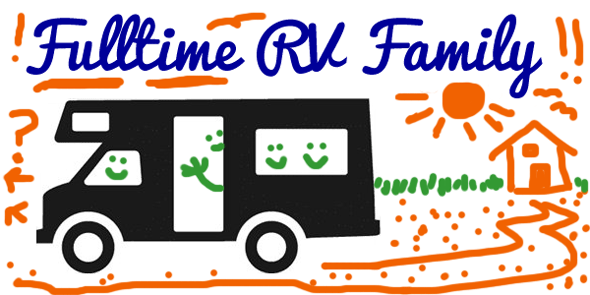
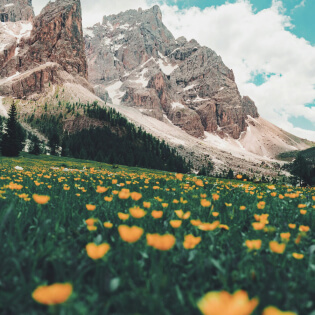

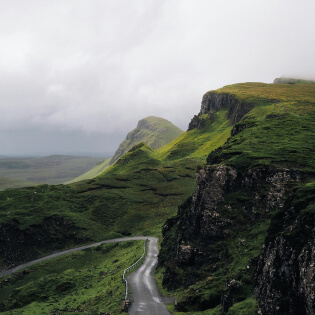
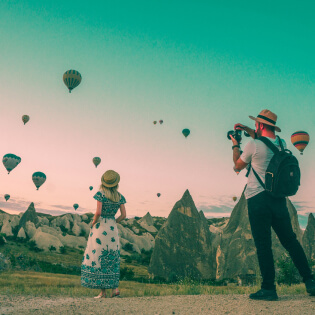
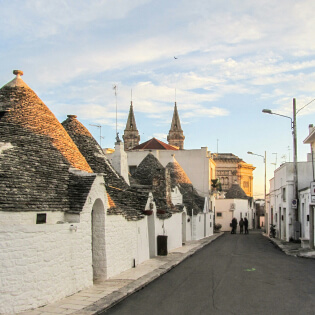
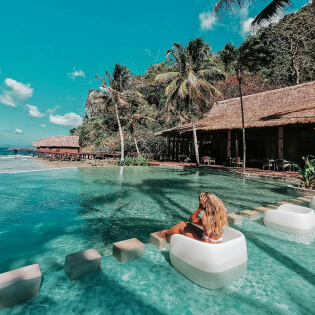
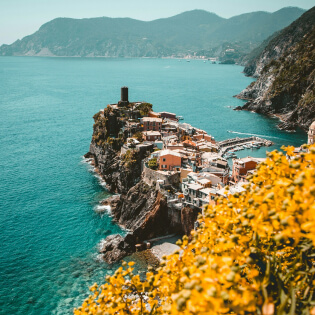
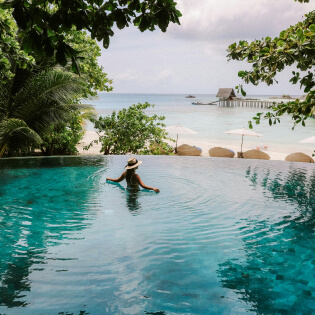
Just caught up with you and the interview with Michael..informative. There is an electric feeling as I read..these travelers issue it that buzz that I can’t quite find the words for just now. It’s a good feeling though. I look forward to more.